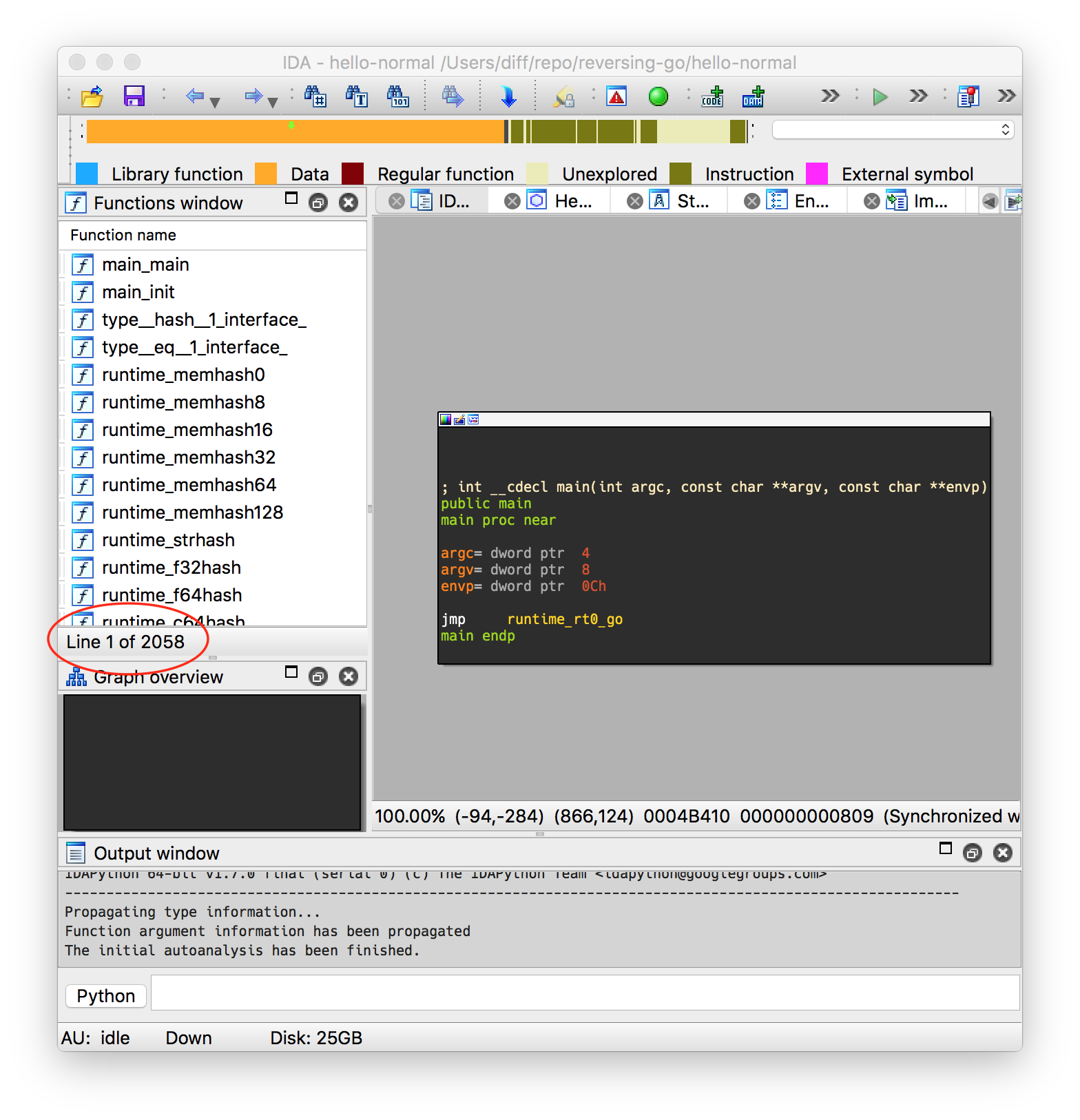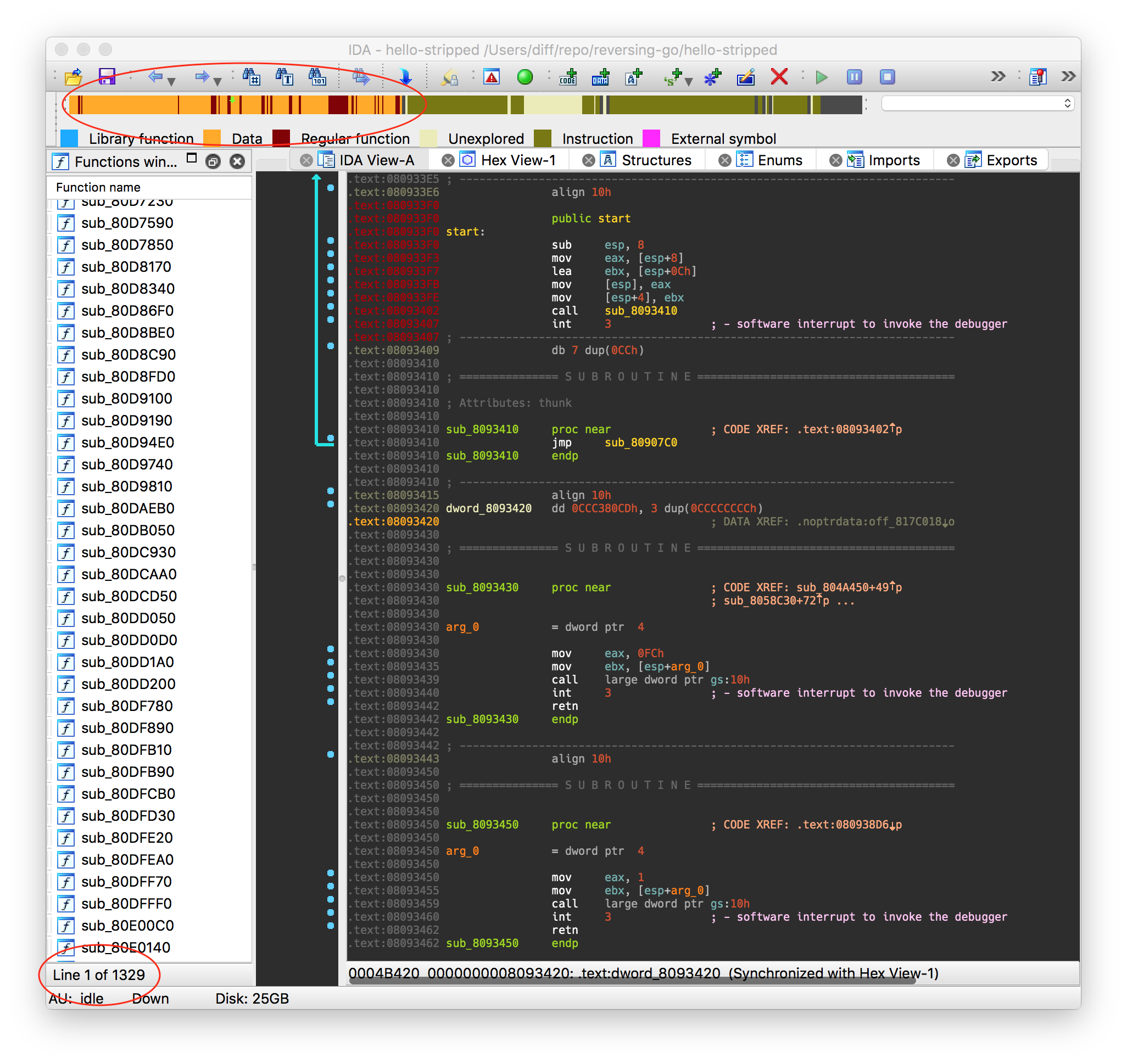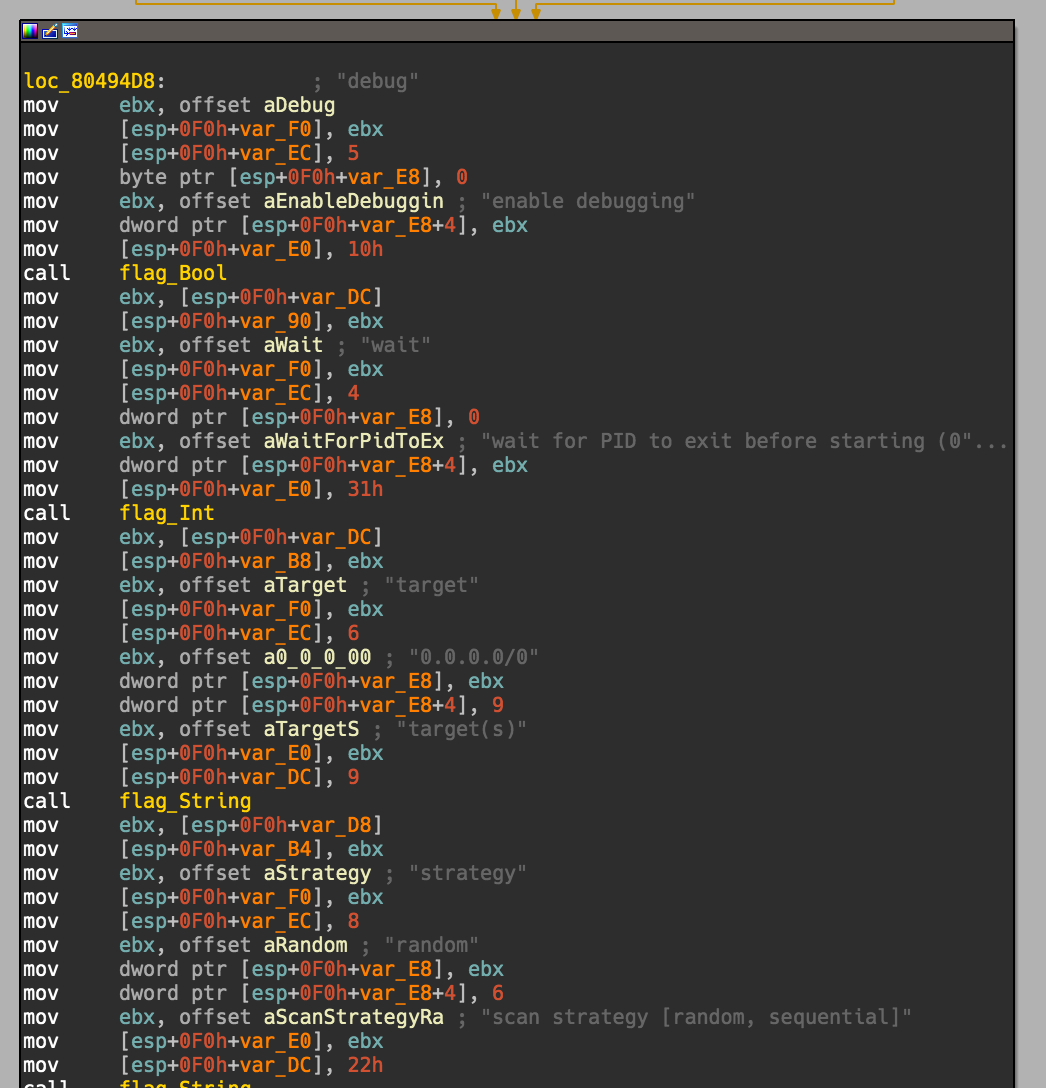GO binaries are weird, or at least, that is where this all started out. While delving into some Linux malware named Rex, I came to the realization that I might need to understand more than I wanted to. Just the prior week I had been reversing Linux Lady which was also written in GO, however it was not a stripped binary so it was pretty easy. Clearly the binary was rather large, many extra methods I didn’t care about - though I really just didn’t understand why. To be honest - I still haven’t fully dug into the Golang code and have yet to really write much code in Go, so take this information at face value as some of it might be incorrect; this is just my experience while reversing some ELF Go binaries! If you don’t want to read the whole page, or scroll to the bottom to get a link to the full repo, just go here.
To illistrate some of my examples I’m going to use an extremely simple ‘Hello, World!’ example and also reference the Rex malware. The code and a Make file are extremely simple;
|
|
|
|
Since I’m working on an OSX machine, the above GOOS and GOARCH variables are explicitly needed to cross-compile this correctly. The first line also added the ldflags option to strip the binary. This way we can analyze the same executable both stripped and without being stripped. Copy these files, run make and then open up the files in your disassembler of choice, for this blog I’m going to use IDA Pro. If we open up the unstripped binary in IDA Pro we can notice a few quick things;

Well then - our 5 lines of code has turned into over 2058 functions. With all that overhead of what appears to be a runtime, we also have nothing interesting in the main() function. If we dig in a bit further we can see that the actual code we’re interested in is inside of main_main;

This is, well, lots of code that I honestly don’t want to look at. The string loading also looks a bit weird - though IDA seems to have done a good job identifying the necessary bits. We can easily see that the string load is actually a set of three movs;
|
|
This isn’t exactly revolutionary, though I can’t off the top of my head say that I’ve seen something like this before. We’re also taking note of it as this will come in handle later on. The other tidbit of code which caught my eye was the runtime_morestack_context call;
|
|
This style block of code appears to always be at the end of functions and it also seems to always loop back up to the top of the same function. This is verified by looking at the cross-references to this function. Ok, now that we know IDA Pro can handle unstripped binaries, lets load the same code but the stripped version this time.

Immediately we see some, well, lets just call them “differences”. We have 1329 functions defined and now see some undefined code by looking at the navigator toolbar. Luckily IDA has still been able to find the string load we are looking for, however this function now seems much less friendly to deal with.

We now have no more function names, however - the function names appear to be retained in a specific section of the binary if we do a string search for main.main (which would be repesented at main_main in the previous screen shots due to how a . is interpreted by IDA);
|
|
Alright, so it would appear that there is something left over here. After digging into some of the Google results into gopclntab and tweet about this - a friendly reverser George (Egor?) Zaytsev showed me his IDA Pro scripts for renaming function and adding type information. After skimming these it was pretty easy to figure out the format of this section so I threw together some functionally to replicate his script. The essential code is shown below, very simply put, we look into the segment .gopclntab and skip the first 8 bytes. We then create a pointer (Qword or Dword dependant on whether the binary is 64bit or not). The first set of data actually gives us the size of the .gopclntab table, so we know how far to go into this structure. Now we can start processing the rest of the data which appears to be the function_offset followed by the (function) name_offset). As we create pointers to these offsets and also tell IDA to create the strings, we just need to ensure we don’t pass MakeString any bad characters so we use the clean_function_name function to strip out any badness.
|
|
The above code won’t actually run yet (don’t worry full code available in this repo ) but it is hopefully simple enough to read through and understand the process. However, this still doesn’t solve the problem that IDA Pro doesn’t know all the functions. So this is going to create pointers which aren’t being referenced anywhere. We do know the beginning of functions now, however I ended up seeing (what I think is) an easier way to define all the functions in the application. We can define all the functions by utilizing runtime_morestack_noctxt function. Since every function utilizes this (basically, there is an edgecase it turns out), if we find this function and traverse backwards to the cross references to this function, then we will know where every function exists. So what, right? We already know where every function started from the segment we just parsed above, right? Ah, well - now we know the end of the function and the next instruction after the call to runtime_morestack_noctxt gives us a jump to the top of the function. This means we should quickly be able to give the bounds of the start and stop of a function, which is required by IDA, while seperating this from the parsing of the function names. If we open up the window for cross references to the function runtime_morestack_noctxt we see there are many more undefined sections calling into this. 1774 in total things reference this function, which is up from the 1329 functions IDA has already defined for us, this is highlighted by the image below;

After digging into mutliple binaries we can see the runtime_morestack_noctext will always call into runtime_morestack (with context). This is the edgecase I was referencing before, so between these two functions we should be able to see cross refereneces to ever other function used in the binary. Looking at the larger of the two functions, runtime_more_stack, of multiple binaries tends to have an interesting layout;

The part which stuck out to me was mov large dword ptr ds:1003h, 0 - this appeared to be rather constant in all 64bit binaries I saw. So after cross compiling a few more I noticed that 32bit binaries used mov qword ptr ds:1003h, 0, so we will be hunting for this pattern to create a “hook” for traversing backwards on. Lucky for us, I haven’t seen an instance where IDA Pro fails to define this specific function, we don’t really need to spend much brain power mapping it out or defining it outselves. So, enough talk, lets write some code to find this function;
|
|
After finding the function, we can recursively traverse backwards through all the function calls, anything which is not inside an already defined function we can now define. This is because the structure always appears to be;
|
|
The above snippet is a random undefined function I pulled from the stripped example application we compiled already. Essentially by traversing backwards into every undefined function, we will land at something like line 0x0808994B which is the call runtime_morestack. From here we will skip to the next instruction and ensure it is a jump above where we currently are, if this is true, we can likely assume this is the start of a function. In this example (and almost every test case I’ve run) this is true. Jumping to 0x08089910 is the start of the function, so now we have the two parameters required by MakeFunction function;
|
|
That code bit is a bit lengthy, though hopefully the comments and concept is clear enough. It likely isn’t necessary to explicitly traverse backwards recursively, however I wrote this prior to understanding that runtime_morestack_noctxt (the edgecase) is the only edgecase that I would encounter. This was being handled by the is_simple_wrapper function originally. Regardless, running this style of code ended up finding all the extra functions IDA Pro was missing. We can see below, that this creates a much cleaner and easier experience to reverse;

This can allow us to use something like Diaphora as well since we can specifically target functions with the same names, if we care too. I’ve personally found this is extremely useful for malware or other targets where you really don’t care about any of the framework/runtime functions. You can quiet easily differentiate between custom code written for the binary, for example in the Linux malware “Rex” everything because with that name space! Now onto the last challenge that I wanted to solve while reversing the malware, string loading! I’m honestly not 100% sure how IDA detects most string loads, potentially through idioms of some sort? Or maybe because it can detect strings based on the \00 character at the end of it? Regardless, Go seems to use a string table of some sort, without requiring null character. The appear to be in alpha-numeric order, group by string length size as well. This means we see them all there, but often don’t come across them correctly asserted as strings, or we see them asserted as extremely large blobs of strings. The hello world example isn’t good at illistrating this, so I’ll pull open the main.main function of the Rex malware to show this;

I didn’t want to add comments to everything, so I only commented the first few lines then pointed arrows to where there should be pointers to a proper string. We can see a few different use cases and sometimes the destination registers seem to change. However there is definitely a pattern which forms that we can look for. Moving of a pointer into a register, that register is then used to push into a (d)word pointer, followed by a load of a lenght of the string. Cobbling together some python to hunt for the pattern we end with something like the pseudo code below;
|
|
The above code could likely be optimized, however it was working for me on the samples I needed. All that would be left is to create another function which hunts through all the defined code segments to look for string loads. Then we can use the pointer to the string and the string length to define a new string using the MakeStr. In the code I ended up using, you need to ensure that IDA Pro hasn’t mistakenly already create the string, as it sometimes tries to, incorrectly. This seems to happen sometimes when a string in the table contains a null character. However, after using code above, this is what we are left with;

This is a much better piece of code to work with. After we throw together all these functions, we now have the golang_loader_assist.py module for IDA Pro. A word of warning though, I have only had time to test this on a few versions of IDA Pro for OSX, the majority of testing on 6.95. There is also very likely optimizations which should be made or at a bare minimum some reworking of the code. With all that said, I wanted to open source this so others could use this and hopefully contribute back. Also be aware that this script can be painfully slow depending on how large the idb file is, working on a OSX El Capitan (10.11.6) using a 2.2 GHz Intel Core i7 on IDA Pro 6.95 - the string discovery aspect itself can take a while. I’ve often found that running the different methods seperately can prevent IDA from locking up. Hopefully this blog and the code proves useful to someone though, enjoy!